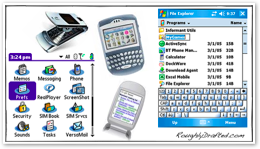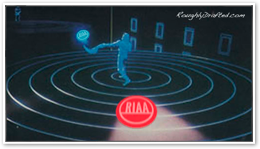

Inside the iPhone: FairPlay DRM and the iTunes Store
The iPhone isn't just a standalone hardware device. It's an iPod, and like the earlier iPods, its integration with iTunes will provide it with a variety of advantages in the areas of sync, software installation, and simplicity.
Competing phones, from the Palm Treo to WinCE / Windows Mobile devices and phones from Nokia, Motorola, and other independent manufacturers all suffer from a variety of consistency problems that were outlined in Device Problems In Search of a Solution. In general, all lack:
-
•Consistent User Interface
-
•Consistent Stability
-
•Consistent Data Sync
-
•Consistent and Fair DRM
User interface and overall stability were considered in the last article: Inside The iPhone: UI, Stability, and Software.
A comparison of the iPhone’s sync in relation to Palm OS, WinCE, and other mobiles appeared in Inside The iPhone: Wireless and Sync Services vs. Palm, WinCE. Here’s a look at DRM, and how the iPhone will address the issue on the iPhone.
Solving DRM Problems
On today’s iPods, DRM is handled entirely by iTunes. The only DRM that iTunes supports is the content from the iTunes Store. No other content, including podcasts or ripped CDs and movies, ever has any DRM applied at all.
Apple limits FairPlay DRM playback to five registered computers, but protected content on any of those machines can be synced to any number of iPods; Apple doesn't track or limit how many iPods are used.
If iTunes allows a user to put something on an iPod, the iPod will play it without any second guessing. The iPod is tethered to iTunes, so it doesn’t need to think for itself. That design greatly simplifies Apple’s DRM, and makes it nearly transparent to users. It also helps to make FairPlay consistent and fair: songs can’t expire.
If Apple changed things to allow the iPhone to download music directly over WiFi or EDGE, the iPhone would have to manage DRM itself, and handle its own media library as well. That would complicate both the device and the FairPlay security model. It's simply better to leave all that baggage in iTunes on a synced PC. Here’s why:
An Ugly Alternative
If Apple made it possible for the iPod to download anyone’s DRM music, and enforce various other DRM schemes onboard the iPod, it would open the door for exploding media rentals and obliterate everything simple and fair about its system.
In order to support “downloads on demand,” the iPod would have to either adopt Microsoft’s Janus DRM, or modify its own FairPlay to the point where it would closely resemble Janus.
Apple’s version of a Janus-like system would be no better than Microsoft’s; further, support for Janus-style DRM from any source would not be an iPod feature, but rather a major flaw.
Today, third parties who want to sell music to iPod customers have to ship their music as unprotected MP3s or on standard, iTunes rippable CDs. Indie bands and other labels who want to distribute their music online can also sell through the iTunes Store, where Apple consistently sets prices low to encourage sales.
Music sales for Apple are a means to an end: selling iPods and other hardware. Apple only makes a few cents on each song downloaded, which barely covers its costs to continuously develop upon iTunes and host fast media downloads in the iTunes Store. Apple knows where the money is: hardware.
Microsoft’s PlaysForSure and Zune both aimed at developing a business around selling subscriptions and service plans, but most consumers already have a music library. They want a device that plays their music, not a player that charges them for new music. That’s why nobody else is selling any music online.
Apple’s DRM-Restriction Management
Analysts who are boo-hooing that Apple’s FairPlay DRM is holding back the potential storm winds of DRM-free music distribution are simply ignorant panic mongers. Sales of iTunes’ DRM protected tracks are no threat to either CDs or MP3s, as sales reports clearly indicate.
These are the same characters who oscillate between saying that iTunes is a dangerous monopoly threatening life as we know it, while at the same time professing to believe that iTunes music sales are collapsing.
 Apple’s FairPlay and the iPod’s majority position in sales is actually pushing the adoption of unencumbered music, not threatening it.
Apple’s FairPlay and the iPod’s majority position in sales is actually pushing the adoption of unencumbered music, not threatening it.As long as Apple can establish its own DRM as the most popular standard for online distribution, the only way for third parties to sell music to the majority of music players will be to use a format unencumbered by DRM, because that’s the only thing the iPod plays apart from Apple’s own FairPlay tracks.
The problem that remains for unencumbered music is the lack of any real market, because any music sold as an MP3 can effortlessly be thrown on a torrent site for mass duplication.
Apple wants to maintain control over DRM, not because it plans to obliterate MP3s or CDs, but because it wants to make sure that the majority of music and movies available are compatible with the Macs and iPods it sells.
Apple vs. Real, Sony, Microsoft
In the past, whenever Real, Sony, or Microsoft appeared poised to gain the upper hand in DRM, they would act to make sure that their format was the only one available. All three actively sought to eliminate the MP3 format and replace it entirely with their own proprietary format, at least back when they were considered contenders.
Beyond seeking to kill all open content, Real, Sony, and Microsoft all provided either little or no support for Apple’s Mac in their anti-MP3 DRM products. Microsoft still doesn’t support the Mac in its Windows Media Player or Zune versions of DRM. Real dropped the ball in Mac support, and Sony’s products were all mostly Windows only.
As the industry for online music and movies developed, Apple realized that if the Mac were left incompatible with mainstream DRM it would kill Apple. If the company only supported open content, Microsoft would eventually be left standing as the only way for studios to sell their music and movies. Nobody would sell anything open.
Apple Steals DRM Control
The first generations of iPods were designed only to play open formats, including MP3. Apple eventually convinced the labels to try selling their content using FairPlay, rather than attempting to securely lock things down using technology like Janus that would render content playable only on a Windows PC or Janus sanctioned player.
Apple now owns the protected online music market--with over 2 billion downloads so far--but it has also always fully supported MP3 and other open formats for playback on the Mac and the iPod.
Apple has no record label or movie studio to answer to like Sony, no operating system monopoly to maintain like Microsoft, and no desperate adware business model to propagate like Real. Apple has no conflict of interest.
While DRM can pose a real danger, its threat comes from the unfair use of market leverage to play to the interests of content owners.
Rival DRM efforts have always sought to curry the support of labels over the demands of customers: limiting fair use rights, overcharging, and making it impossible to make reasonable copies at home.
Apple is the best possible party to own control of DRM, because its allegiance lies with the source of it profits: hardware buying customers.
Apple wants to expand its 2% share of the worldwide PC market, and continue to sell iPods and the new iPhone. It’s not going to make any progress in selling hardware by jacking up DRM prices or introducing new rules. That’s why it has been working to keep online media and software prices low and as attractively “fair” as possible.
Next Articles:
This Series


 |
|
 |
|
 Del.icio.us |
Del.icio.us |
 Technorati |
About RDM :
:
Technorati |
About RDM :
:

Thursday, January 18, 2007






 Send Link
Send Link Reddit
Reddit NewsTrust
NewsTrust






